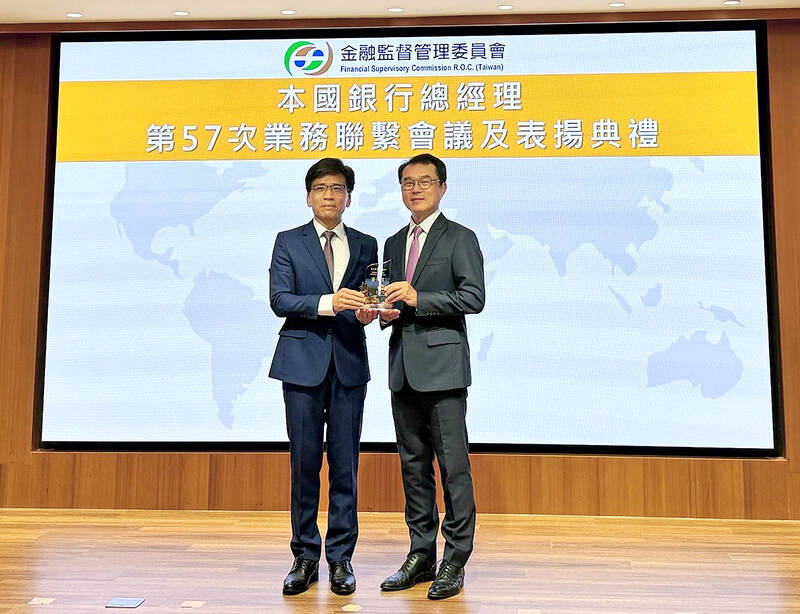Taiwanese banks extended NT$150.3 billion (US$4.63 billion) in new loans to nations included in the government’s New Southbound Policy (NSP) during the first four months of this year, led by lending to India and Australia, data compiled by the Financial Supervisory Commission showed earlier this month.
The figure is 1.8 times the NT$83.9 billion in new loans to the NSP nations recorded for the whole of last year and 2.37 times the commission’s annual new loan target of NT$63.4 billion for this year, indicating a steady recovery in fund demand in those markets, the regulator said.
The policy, introduced in 2016, is designed to enhance trade and exchanges between Taiwan and 18 nations in Southeast Asia, South Asia and Oceania: Australia, Bangladesh, Bhutan, Brunei, Cambodia, India, Indonesia, Laos, Malaysia, Myanmar, Nepal, New Zealand, Pakistan, Philippines, Singapore, Sri Lanka, Thailand and Vietnam.

Photo courtesy of Taipei Fubon Commercial Bank
Local banks have in the past few years not only increased lending to clients expanding operations in those nations, but also launched new branches or representative offices in the countries in hopes of attracting more business opportunities.
In April, the commission approved Far Eastern International Bank’s (遠東銀行) application to set up a branch in Singapore and permitted O-Bank Co (王道銀行) to launch a representative office in Sydney, Australia, after in February allowing Taipei Fubon Commercial Bank (台北富邦銀行) to open a branch in Mumbai, India.
During the first four months of this year, new loans to India totaled NT$80.2 billion, topping all other NSP nations, followed by Australia with NT$32 billion, Singapore with NT$18.2 billion and Vietnam with NT$13.1 billion, commission data showed.
By individual banks, Taipei Fubon was the most active with new loans of NT$18.9 billion in the first four months, ahead of CTBC Bank’s (中國信託銀行) NT$18 billion and Bank SinoPac’s (永豐銀行) NT$10 billion, followed by Taishin International Bank (台新銀行) with NT$9.7 billion and Chang Hwa Commercial Bank (彰化銀行) with NT$9.3 billion, the data showed.
Overall, Taiwanese banks’ outstanding loans to the 18 nations at the end of April totaled NT$1.74 trillion, the data showed.

Power supply and electronic components maker Delta Electronics Inc (台達電) yesterday said second-quarter revenue is expected to surpass the first quarter, which rose 30 percent year-on-year to NT$118.92 billion (US$3.71 billion). Revenue this quarter is likely to grow, as US clients have front-loaded orders ahead of US President Donald Trump’s planned tariffs on Taiwanese goods, Delta chairman Ping Cheng (鄭平) said at an earnings conference in Taipei, referring to the 90-day pause in tariff implementation Trump announced on April 9. While situations in the third and fourth quarters remain unclear, “We will not halt our long-term deployments and do not plan to

‘SHORT TERM’: The local currency would likely remain strong in the near term, driven by anticipated US trade pressure, capital inflows and expectations of a US Fed rate cut The US dollar is expected to fall below NT$30 in the near term, as traders anticipate increased pressure from Washington for Taiwan to allow the New Taiwan dollar to appreciate, Cathay United Bank (國泰世華銀行) chief economist Lin Chi-chao (林啟超) said. Following a sharp drop in the greenback against the NT dollar on Friday, Lin told the Central News Agency that the local currency is likely to remain strong in the short term, driven in part by market psychology surrounding anticipated US policy pressure. On Friday, the US dollar fell NT$0.953, or 3.07 percent, closing at NT$31.064 — its lowest level since Jan.

The US dollar was trading at NT$29.7 at 10am today on the Taipei Foreign Exchange, as the New Taiwan dollar gained NT$1.364 from the previous close last week. The NT dollar continued to rise today, after surging 3.07 percent on Friday. After opening at NT$30.91, the NT dollar gained more than NT$1 in just 15 minutes, briefly passing the NT$30 mark. Before the US Department of the Treasury's semi-annual currency report came out, expectations that the NT dollar would keep rising were already building. The NT dollar on Friday closed at NT$31.064, up by NT$0.953 — a 3.07 percent single-day gain. Today,

The New Taiwan dollar and Taiwanese stocks surged on signs that trade tensions between the world’s top two economies might start easing and as US tech earnings boosted the outlook of the nation’s semiconductor exports. The NT dollar strengthened as much as 3.8 percent versus the US dollar to 30.815, the biggest intraday gain since January 2011, closing at NT$31.064. The benchmark TAIEX jumped 2.73 percent to outperform the region’s equity gauges. Outlook for global trade improved after China said it is assessing possible trade talks with the US, providing a boost for the nation’s currency and shares. As the NT dollar